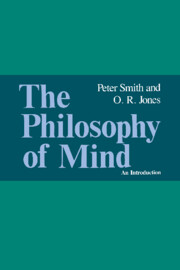Book contents
- Frontmatter
- Contents
- Preface
- Analytical Table of Contents
- PART I Dualism, For and Against
- PART II Towards a Better Theory of the Mind
- VI An Aristotelian Framework
- VII Perception and Sense-Data
- VIII Perception and the Acquisition of Beliefs
- IX Action and Volition
- X Two Theories of Belief
- XI The Function of Beliefs
- XII Functionalism and Folk Psychology
- XIII Assessing the Functionalist Theory
- PART III Sensation, Thought and Freedom
- Chronological Table
- Guide to Further Reading
- Bibliography
- Index
XI - The Function of Beliefs
Published online by Cambridge University Press: 27 January 2010
- Frontmatter
- Contents
- Preface
- Analytical Table of Contents
- PART I Dualism, For and Against
- PART II Towards a Better Theory of the Mind
- VI An Aristotelian Framework
- VII Perception and Sense-Data
- VIII Perception and the Acquisition of Beliefs
- IX Action and Volition
- X Two Theories of Belief
- XI The Function of Beliefs
- XII Functionalism and Folk Psychology
- XIII Assessing the Functionalist Theory
- PART III Sensation, Thought and Freedom
- Chronological Table
- Guide to Further Reading
- Bibliography
- Index
Summary
After our negative attacks on Hume and Ryle, we must now turn to develop a positive theory of belief. Since we have already argued that perception is essentially a matter of the acquisition of beliefs, and that action is behaviour caused by appropriate beliefs and desires, the account we give of belief must be central to our whole conception of the mind, and will need to be explored and defended at some length. Our exploration starts in the present chapter, which outlines a skeleton account of the nature of belief-states. The discussion continues in the following chapter which aims to put some more flesh on the bare bones, and incidentally sketches a companion theory of desire.
We begin by returning to Ryle's version of the idea that beliefs are behavioural dispositions. In the previous chapter, we offered three objections to this theory of belief: but it turns out that all three objections can be met by making what seems on the surface to be a simple alteration to the theory. Consider again the Rylean analysis, which runs along the following lines:
(I) Jack's believing that it is about to rain (for example) is simply a matter of its being true that: if circumstances A were to obtain, Jack would get in the washing; if circumstances B were to obtain, he would take his umbrella; and so on.
As Armstrong (among many others) has commented,
it goes profoundly against the grain to think of the mind as [mere patterns of] behaviour. The mind is rather what stands behind and brings about our complex behaviour.
(1965: 74-5)Information
- Type
- Chapter
- Information
- The Philosophy of MindAn Introduction, pp. 152 - 162Publisher: Cambridge University PressPrint publication year: 1986
